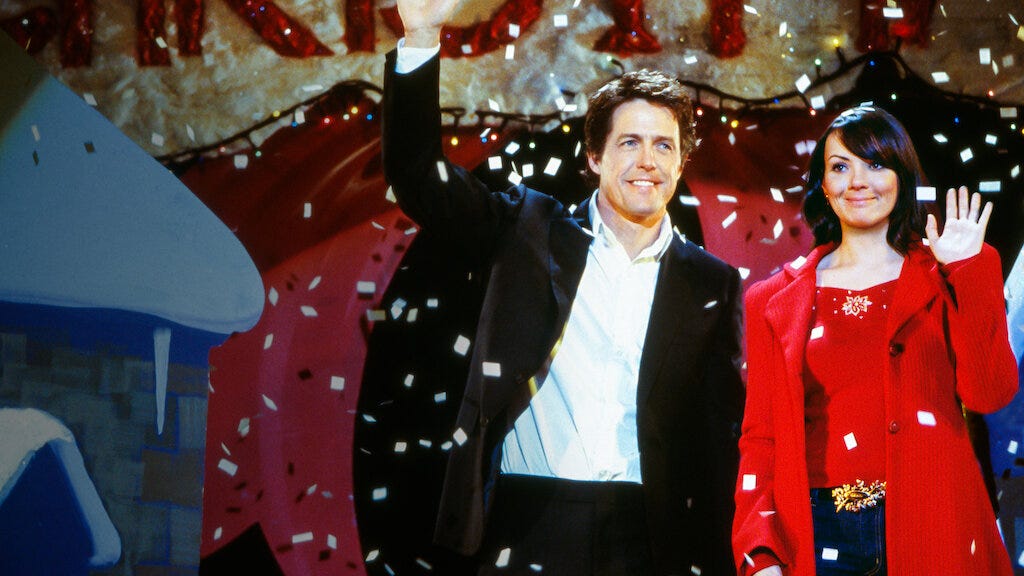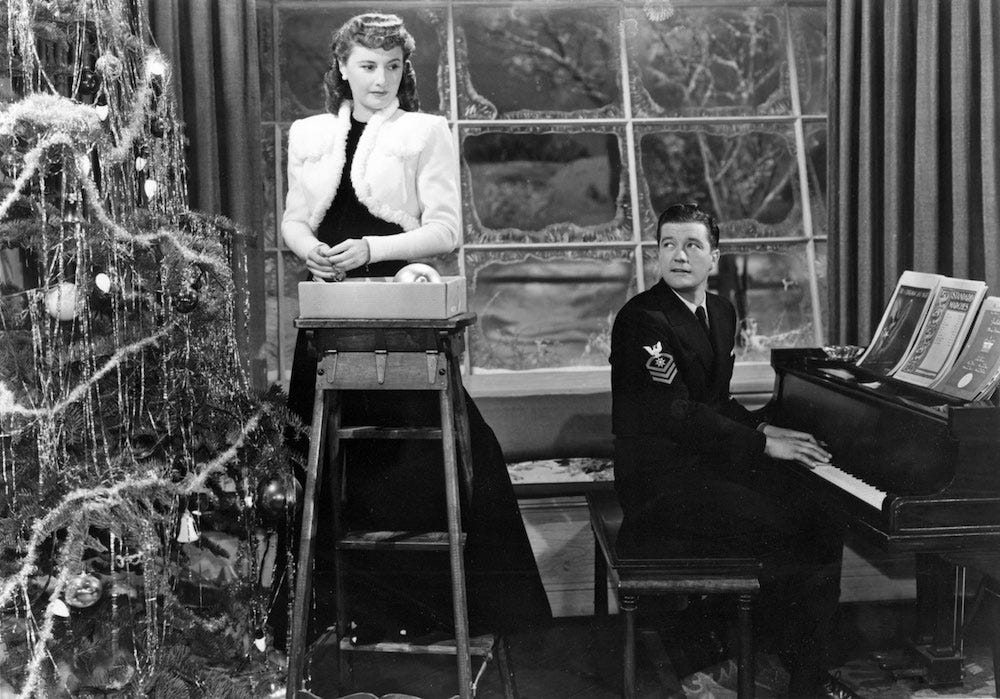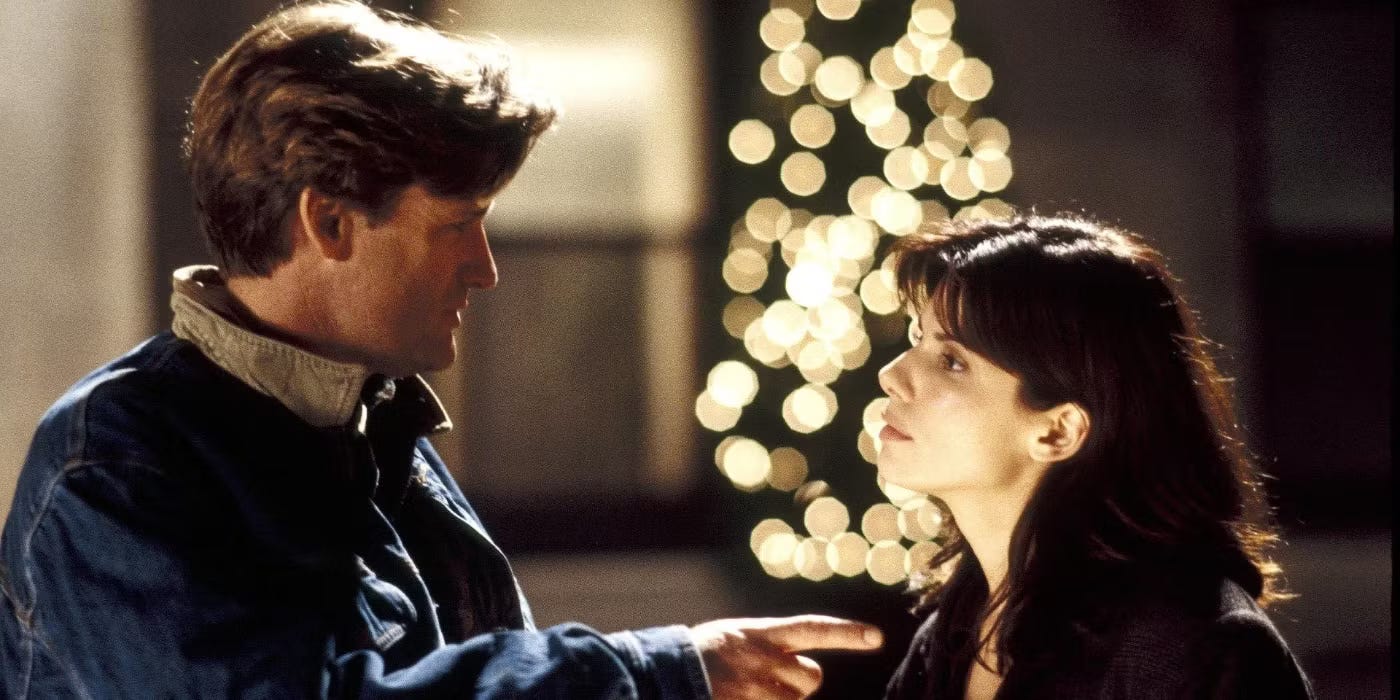The official Girl Culture Christmas movie canon
Highlights from the When Romance Met Comedy archives
Welcome to Girl Culture, the newsletter where Caroline Siede examines pop culture, feminism, and more. You can learn about Girl Culture’s mission here and support here.
For reasons both happy and sad, December has been a really challenging month for my work/life balance. But since I didn’t want my dear readers to go without a post from me this month, I thought I’d pull out a classic Christmas staple and re-gift you some of my old work instead!
As some of you know but perhaps many of you don’t, I spent four years writing a bimonthly column about romantic comedies for The A.V. Club, including at least one Christmas rom-com each December. And since the When Romance Met Comedy archives are increasingly hard to find on The A.V. Club’s redesigned site, I decided to collect all my Christmas rom-com writing in one place for your Yuletide convenience.
Hopefully you’ll find a new recommendation or feel inspired to revisit an old favorite. At the very least, you’ll get to enjoy some of my hottest takes to warm you up this holiday season.
Without hope or agenda: A defense of Love Actually
Rewatching the film with fresh eyes made me realize that beyond aiming to be the ultimate romantic comedy ever made, Love Actually is even more so trying to be a musical. Craig Armstrong’s sweeping orchestral score is the film’s fifth most important character, and needle drops punctuate just about every big emotional moment, most memorably when Joni Mitchell expresses Emma Thompson’s heartbroken internal monologue. The chart-topping Christmas novelty song recorded by aging rock star Billy Mack (Bill Nighy) plays throughout the film. There’s a surprise wedding performance, a pop song at a funeral, and an extended sequence of the prime minister grooving to The Pointer Sisters. And, of course, there’s also a full-on musical production number of “All I Want For Christmas Is You.”
Musicals favor emotional expression over realism and so does Love Actually, which is a critique that’s sometimes lodged against the film (as well argued by Christopher Orr and well rebutted by Ben Dreyfuss). But I don’t think Love Actually’s lack of realism or depth is inherently a bad thing. … Love Actually isn’t trying to tell nine well-rounded love stories, it’s offering a tapestry of love (or at least a tapestry of wealthy, white, heterosexual, London-based love) in which the whole is greater than the sum of its parts. [Read more]
On falling in love with The Family Stone
If I’ve come up with a grand thesis over the past four years of writing about romantic comedies for this column, it’s that I genuinely think people watch rom-coms differently than they watch other movies. They either go in with their hackles raised, ready to mock the plot swerves that exist outside of the realm of realism, or they watch them passively, automatically assuming there’s little meat on their bones. And while experiencing a romantic comedy in either of these ways can be perfectly enjoyable, doing so often means missing out on the details and intentions that fuel the genre at its best. I should know, because I’m guilty of doing just that to The Family Stone.
The second most divisive Christmas romance after Love Actually, The Family Stone earned mixed reviews on its release but enjoyed a solid box office showing and has only grown in esteem over the past 16 years. Many now consider it part of the contemporary Christmas canon. And while past viewings of The Family Stone never really did it for me, the film sprang to life when I rewatched it more closely for this column. This time around, I came to appreciate the intentionally thorny things it’s attempting to explore, as well as the Christmas magic it purposefully (if only semi-successfully) deploys with its sister-swapping love stories. I get why The Family Stone is something of an acquired taste, but I also think it’s one worth acquiring. [Read more]
Celebrate Christmas with the subversive 1940s rom-com that turned gender roles on their head
I grew up on a steady stream of ’80s and ’90s comedies about how hilarious it would be if men had to parent their own kids. So you can imagine my surprise when I flipped on TCM a few years ago and discovered a romantic comedy from the 1940s that featured its dreamy male lead bathing a baby with the confidence of a well-practiced babysitter. There’s humor at play—he’s taking over for a woman who’s merely pretending to be a mother and the whole sequence has the high stakes of a false-identity farce. But the laughs come from the goofy situation, rather than at the expense of either of the characters. Instead, his natural nurturing abilities are part of his romantic appeal and her complete incompetence is part of her quirky charm. It’s a subtly progressive scenario that honestly wouldn’t feel out of place in a contemporary rom-com.
Such is the gift of Christmas In Connecticut, a thoroughly wacky 1945 screwball comedy that also doubles as a fascinatingly subversive commentary on conventional gender roles. It’s a bit of a hidden gem in the Christmas canon. Though it’s a favorite of TCM (and Tom Hanks), it hasn’t achieved the perennial status of It’s A Wonderful Life or White Christmas. Like those movies, however, it’s also set against the backdrop of World War II. And it uses its Christmas fun to specifically, if subtly, examine the seismic cultural changes brought on by the war. [Read more]
Sandra Bullock became a rom-com star with a cozy love story about crushing loneliness
Lucy Moderatz spends her days behind a glass window in a Chicago Transit Authority booth and her nights home alone with her cat. On the surface, it sounds like the setup for the worst kind of stereotypical rom-com heroine desperate for love. In practice, however, 1995’s While You Were Sleeping paints a refreshingly honest portrait of the painful reality of urban loneliness. Unlike rom-coms that center on romance for romance’s sake, While You Were Sleeping roots the idea of dating and marriage in what it actually is for many people: a way to start, join, or blend a family. That thoughtful emotional core is even more impressive considering it comes from a movie about a woman who pretends to be a coma patient’s fiancée.
Perhaps because of the serendipity of its creation, While You Were Sleeping feels like it stands slightly apart from the ’90s rom-com boom and the Christmas movie genre, even though it’s very much a part of both. It’s a happy movie that acknowledges the holidays can be a sad time for a lot of people. “You have no idea what it’s like to be alone,” Lucy says at one point, not about dating in particular, just about her life in general. Though loneliness has reportedly been on the rise in recent years, it’s a topic people are still often uncomfortable talking about openly. While You Were Sleeping uses its goofy central premise to reach out a sympathetic hand to anyone struggling with isolation. The coma may be a gimmick, but Lucy’s arc never feels like one. [Read more]
Why are Hallmark Christmas movies so addictive?
If you happen to flip on the Hallmark Channel at any point between late October and early January, you’ll be transported to an alternate dimension that looks vaguely like our own but where the teeth are whiter, the snow is faker, and the unbridled passion for Christmas is frighteningly forceful. No one in a Hallmark Christmas movie can just casually enjoy the holiday season—they must either have a manic enthusiasm for Christmas or their lack of zeal must be a major plot point to be resolved.
In a Hallmark Christmas movie, cookies are never just “cookies,” but always “Christmas cookies.” Hot chocolate is exclusively referred to as “hot cocoa.” Mistletoe is taken deadly seriously. If any of the actors involved have even the faintest ability to ice skate, you better believe there’s going to be a scene set at an ice rink.
Even the most earnest of Hallmark Channel fans would likely admit that these movies are “cheesy.” And that’s kind of the point. Hallmark Christmas movies are like PBR or Taco Bell: It’s not that you don’t know there are better, higher quality options out there. It’s that you’re craving the specific taste (not to mention the cheap convenience) of a familiar favorite. And good god do they go down even easier than a Crunchwrap Supreme served with an ice cold beer. [Read more]
With just two storylines, The Holiday paid tribute to the entire rom-com genre
It’s immediately clear that The Holiday’s protagonists are two very different types of people. Iris is a lovelorn sad sack who can’t find the courage to speak up for herself, while Amanda is a high-strung control freak who hasn’t cried since she was 15 years old. But what’s maybe less immediately apparent is that they’re in two very different kinds of romantic comedies. After Amanda impulsively hooks up with Iris’ dashing older brother, Graham (Jude Law), they fall into a two-hander in the vein of When Harry Met Sally, in which both of the romantic leads have their own arcs. Iris, however, experiences a story that’s closer to Bridget Jones’s Diary or 27 Dresses, in which romance is just one part of the protagonist’s self-actualization journey. It’s what Crazy Ex-Girlfriend showrunner Aline Brosh McKenna calls the “and-a-man” model of storytelling, where finding love is a bonus, not the central focus.
The Holiday is very much a film of its era and its director, which will limit its appeal for those who prefer their romances grounded in something closer to the real world. But unlike Love Actually or its many copycat rom-coms, which attempt to deliver a definitive encapsulation of the genre by cramming in as many storylines as possible, The Holiday uses just two main throughlines to offer an even more effective tribute. It’s designed as a gift to rom-com fans, which makes it a perfect film for the holiday season. [Read more]
I also wrote about some rom-coms that are set at least partially around the holidays, including You’ve Got Mail, Bridget Jones’s Diary, When Harry Met Sally, The Best Man franchise, Moonstruck, Boomerang, Silver Linings Playbook, and The Apartment. And one favorite I sadly didn’t get a chance to write about before the column ended is Queen Latifah’s Last Holiday, which is definitely worth a holiday watch.
Other stuff I’ve worked on lately: I wrote about Wicked’s Ozdust Duet for The A.V. Club; rounded up the highlights of this year’s Netflix/Hallmark/Lifetime holiday slate for The Boston Globe; weighed in on the best TV shows of the year for The A.V. Club; submitted my ballot to IndieWire’s 2024 critics poll of the best movies of the year; voted in the Chicago Film Critics Association Awards; and wrote about Mulan for my current AVC column, Women of Action.











Ooh Christmas in Connecticut sounds so good, added it to my list! Also, if you like Hallmark Christmas movies you might find my post about this year’s Netflix Christmas movies interesting! https://intimatepublics.substack.com/p/all-i-want-for-christmas-is-for-men
I’ve never heard of Christmas is Connecticut, but I’ve added it to my list, thanks! I just rewatched The Holiday and also Greta Gerwig’s Little Women. Little Women feels very unofficially Christmasy to me as well.